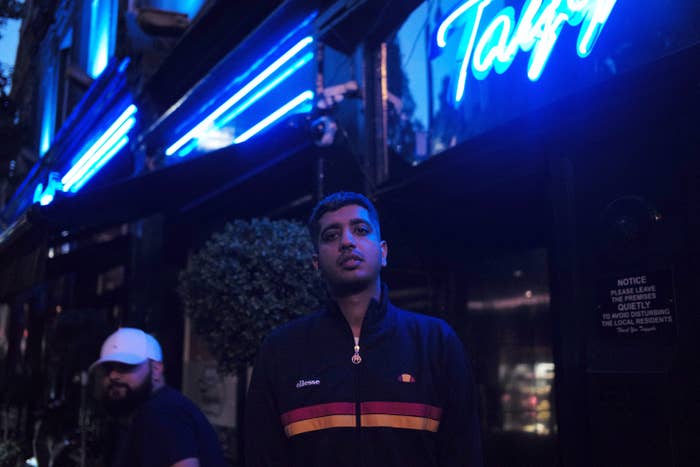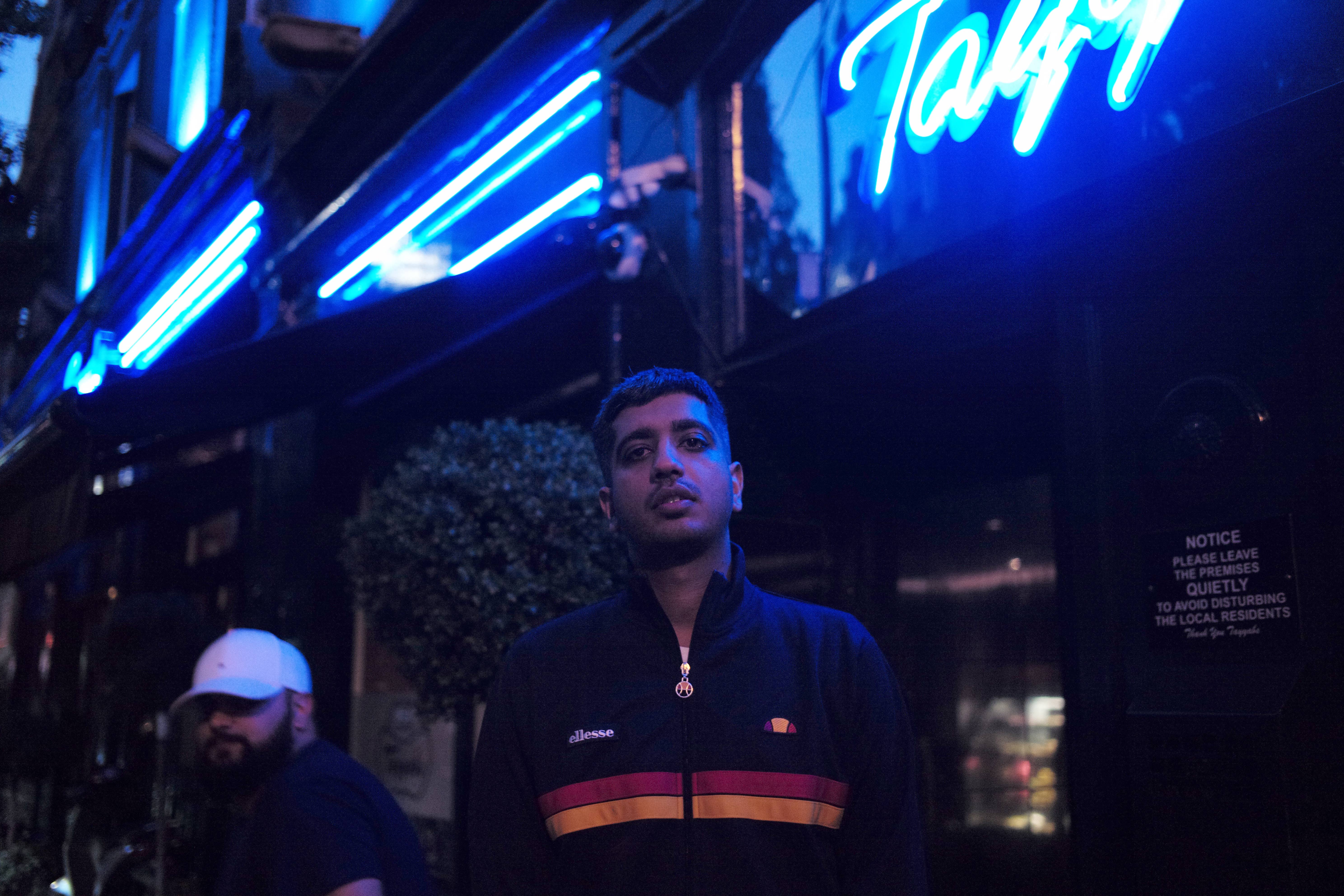
Lamb chops are the definitive Punjabi meat starter, with a rich marinade that blackens in the heat of a clay tandoor oven. But as a pescetarian, Steel Banglez no longer eats them. “You’ll enjoy these,” he says to me, pointing at the sizzling hot-plate of chops on our table. A bangle slides down his wrist. “The chef makes them better when I’m here, I’m telling you!” he adds jovially. It’s a July evening, and we are dining with two of Steel Banglez' childhood friends at Tayyabs, in Whitechapel, east London: arguably the most famous South Asian eatery in the capital.
As the hottest summer in forty years enters its second half, Steel Banglez is one of the most sought-after producers in the UK. Having recently signed to Warner Bros, he is the brains behind numerous crossover, era-defining UK rap hits over the last two years. With a deep understanding of underground rap music, as well as the way in which it funnels-through into popular consciousness as a catchy backdrop to modern, multicultural British life, Steel Banglez is helping shape the sound of contemporary British pop music.
“I was determined to make the most of my time in [prison]. I was studying how to become a superhuman.”
Pahuldip Singh Sandhu, the son of Sikh Indian immigrants, grew-up in Newham, further east from where we are sat in Tayyabs, where he was neighbors with grime legend D Double E, who used to take him along to raves as a teenager. “I’d sit there in the corner, the only Asian kid, taking it all in” he says. After a long summer on the road performing shows and festivals, Banglez seems drained. But he speaks clearly, communicating his worldview by threading fun anecdotes about life as a new star together with philosophical reflections about his rollercoaster ride of a personal journey.
His mother was an Indian music teacher, so as a child he was surrounded by traditional Indian instruments; his father was a poet and journalist who wrote about the politics and culture of Punjab. Whilst spending time in prison, Banglez got hold of a keyboard. “I would play it all day in my cell, and read books about spirituality and laws of attraction...I was determined to make the most of my time in there. I was studying how to become a superhuman.”
“They say it takes a decade to be an overnight success," he says. "Now I just feel like I have a responsibility to make good music for the next generation. It feels amazing." And so it should. Steel Banglez has transcended the producer's usual backroom status, becoming a recognized artist in his own right and a unique influencer in UK music. “I’m not the heart or brain, but I’m still a vital organ of the British music scene,” he puts it, nodding and smiling with conviction.
They say it takes a decade to be an overnight success.
In three whirlwind years, Steel Banglez has gone from being a relatively unknown veteran of underground music-making—in the past, he has worked with grime legends Ghetts and Wiley—to achieving nationwide appreciation at the highest level. As the world’s gaze has continued to fall upon music from London, as MCs like Skepta and Giggs have garnered international acclaim, Banglez has been busy redefining what popular British rap sounds like altogether.
Like an alchemist sourcing local ingredients to make gold, he has combined a plethora of domestic genres—garage, grime, afrobeats, hip-hop—to create his addictive, colorful style of production, and elevate the artists he works with. He has not only been behind eclectic mainstream-leaning tracks like “Bad,” “Money,” and “Your Lovin” over the last year, he has also uplifted young or otherwise ignored artists into more accessible, mainstream visibility. Examples of this co-supportive process include the reinvention of road-rapper Nines for his smooth summer anthem “I See You Shining” (Nines calls Banglez his “guru” because whenever they meet “something good happens”), Mist’s “Ain’t The Same,” Mostack and Dave’s UK Top 20 charting “No Words,” and last month’s “Hot Steppa” with young UK drill star Loski.
“I’d been in the game 7 or 8 years but the clubs weren’t interested,” he says, when I ask about the surge in his success since 2015. “So I asked myself: What do British people really love? What do I love most about Britain? And the answer is UK garage music. You know when you’re young, and it’s the best days of your life, and you don’t give two fucks?” he says, harking back to that time. “I used to get home from school, wipe the needle, turn on the decks, and blast garage.”
But how did he go about applying this appreciation to producing? “I’d seen an interview with DJ Mustard, and he was talking about how he slows down melodies from house music to make his beats, because it makes people want to dance. So I started doing the same with garage. 'Ain’t The Same' with Mist, for example, takes inspiration from a garage tune called 'It Ain’t Enough' by Artful Dodger and The Dream Teem. My drum patterns come from afrobeats, but my basslines and vocal chops come from garage.” This can be heard in the distinctive, high-pitched female vocal samples and jumpy bass of Banglez’ productions. “The people who were raving to garage when they were younger, they’re all having kids now. And it’s their kids listening to my music. So the good times will have been passed down to my fans somewhere, genetically, you know? Everything is recorded. After I realized that, I made 'Karla’s Back.'"
It was the first time I had heard a rapper from the UK showing real love to the British Asian community and bringing us into the consumption of rap music.
“Karla’s Back” by Mist, a rapper who is from Birmingham—second to London, as a city, both in size and as a rising hub of new musical talent—formed the blueprint for Banglez’ hybrid style and subsequent rapid-fire success. The song catapulted both of them to nationwide stardom within weeks of its video release on YouTube. It had come about after Banglez was shown a freestyle that Mist had recorded at the end of 2015, in which he uses the words “apnars” and “karlas,” which are Punjabi for Asian men and black men, respectively.
“My man was speaking Punjabi in his lyrics! It was the first time I had heard a rapper from the UK showing real love to the British Asian community and bringing us into the consumption of rap music,” he explains. “So I messaged Mist on Instagram on 1st January 2016 and sent him a photo of my studio in London.” Banglez makes clear that he only works with artists in-person. “The rest is history: Mist changed my life, I changed his.”
Banglez’ partnership with the local (largely black) British rap scene is testament to the broader collaborative resilience required from young ethnic minorities in London, Birmingham, and beyond in 2018. This summer, as in America and other Western liberal democracies, the threat of, at best, closed-border intolerance, and at worst aggressive nationalism, looms over the future of Britain’s postcolonial, patchwork population. It is a confusing and tense state of affairs.
After the country voted to leave the European Union in 2016, Prime Minister Theresa May’s Conservative government—which has consciously pursued a "hostile environment" for immigrants—has spent two years in diplomatic stalemate, unable to conceive of how the future might look as a standalone island in an increasingly cosmopolitan, intermixing world.
Set against this backdrop, Steel Banglez’ ability to provide a triumphant, eclectic musical escape for the younger generation, allowing for the cross-pollination of Asian, Caribbean and African influences, is needed now more than ever. His efforts might be seen as a sonic cultural defense, a coping mechanism for the confusion of our times.

In the summer of 2016, Banglez posted photos on Instagram of being on tour in the US with Drake and Future. “I hustled that,” he says, when I ask how it came about. “I was at Wireless [Festival] and we met the owner of one of the biggest touring companies in America. We basically just came up with a plan for us to have our own tour bus with a studio on it, and I said to myself: one way or another, I’m going to try and show one of them my beats. The mad thing is we met Drake, we met Future, but it was Birdman who turned up on our bus asking to hear my beats and learn about music from the UK. Then he invited us to his house in Miami. I was like, 'Are you mad!?' This was Scott Storch’s old house, a place I’ve wanted to visit since I was a kid. The place was like something out of Scarface, with opera playing and armed guards at the gate.”
As we mop-up our curries with naans and rotis—Banglez has saag paneer, chunks of cottage cheese cooked in blended spinach—and order kulfi, Indian ice cream, for dessert, I ask what his next steps are. “I want to remain humble and keep doing what I’m doing: shaping the UK music industry, keeping my ear to the streets and working with artists who are at the start of their journey. I’ve been out promoting my brand so soon I’ll be able to go back into the studio and hibernate,” he says.
“Now I’m able to hand my Mum some money so she don’t have to work, I can pay my bills, I’ve paid back my friends who were loyal to me and helped me grow,” he continues, nodding at his friends sat with us at the table. “I want to do philanthropy and start a charity which provides water access in poor areas of the world. I want to write a book about producing and have that documented for future generations to see. I want to be a record label exec in my own way, like Dre. I’m not a materialistic person, really...the important thing is if my sound is so popular that others are inspired by it, it’s my responsibility to keep making new types of music.”
We stand up to leave, and within seconds various teenagers and couples from other tables come over and ask to have their picture taken with Banglez, now a star in his own right. The smells of cumin and fenugreek leaves waft down the backstreet as I see he and his crew climb into a shiny new Range Rover. I hop on my bike and struggle on a full stomach to peddle back to south London.





